Waging Peace: A Rotary Peace Scholar’s Story
In the beautiful city of Portland, Oregon, where I am executive director of Rotarian Action Group for Peace, I am often asked “Where are you from?”
My reply is always the same. “My American hometown is Chapel Hill, North Carolina, and my original hometown is Tulkarem, in the Palestinian Territories. Now, I am a Palestinian-Oregonian.”
“This is interesting,” they respond. “What brought you to the United States?”
I moved to North Carolina from the West Bank to study at the Duke UNC Rotary Peace Center. The Rotary Foundation awards up to fifty fellowships for master’s degrees to fifty promising young leaders from around the world every year. I am honored to be one of them. I studied City and Regional Planning and specialized in Economic Development at the University of North Carolina at Chapel Hill. I also studied International Peace and Conflict Resolution at Duke University.
That experience changed the course of my life, and put me on the path I am on today.
My personal mission is to build mutual understanding on important issues for peace that revolve around compassion, empowering individuality, and embracing differences in a positive light.
Growing up in a zone of daily conflict and danger, I was confused and sad. My gastroenterologist dad Dr. Salim Ghunaim helped me start my long journey of reflection about healing and peace. I was about ten years old when I was checking my dad’s library. I picked the only medical book that was translated into Arabic in his library. On the first page, in beautiful, noble script, was the Hippocratic Oath. It described how a knife as a tool in the hand of a doctor is to heal, not to harm. The script in Arabic also mentioned that if an enemy soldier was injured in the presence of a physician, that the physician had to help him. When I first read this part, as a ten year old who had grown up witnessing the pain and humiliation of my community, I was challenged.
I went to my dad and asked him: “Would you treat anyone who came into the emergency room, regardless?” He said: “Yes. It is the right thing to do. My duty is to save lives, regardless of whose life I am saving.”
From that day, I learned that I had the power to define myself and my mission. I realized that I could not allow conflict to pollute the beauty and human purity within me with fear and frustration. I have the power to love, to forgive, and to reconcile. We all have the seeds of peace within us. We determine whether we want to water these with righteous choices, so they can grow within us and thrive beyond ourselves.
My mom, Najla, is the most articulate, beautiful, and elegant woman I know. She reads a lot and every time I arrived at her beauty salon as a child after school, she would ask me to go buy her the daily newspaper from a nearby bookstore, and she told me to buy a book for myself to read. I was able to read a children’s book every day. I learned from her about charity. My mom liked to give in secrecy, to avoid any temptation of ego or vanity, or to avoid any indication of condescension to others. Therefore, when I accompanied her, she ordered me to stay in the car. Once, as I peeked from the car window, I saw my mom knocking at a door to a home about to collapse. A woman opened the door. Mom greeted the woman and gave her something in her hand. The woman and my mom hugged afterward and they were both in tears. When my mom returned to the car, I asked her as she was wiping her tears, “Mom, why were you crying?” She told me, “Because I am the poor one. I just became rich by this woman’s thankful tears, and pure love and prayers for me and my family.” My mom was so humbled by giving, and I learned from her that serving others always starts from a place of humility.
My parents have always been my favorite people in the entire world and my heroes. Their deep love for each other had a big impact on me. My dad wrote beautiful and moving love poems for my mom and he kept them in a journal. In one of these poems, he described how his community was against my parents holding hands while they were on a walk together. In this poem, he describes how he proudly defied this disapproval. My parents taught me that “conformist thinking” is not a productive path.
I also learned from members of my community about resilience of spirit. One of our neighbors, a charismatic, popular schoolboy of my own age, was shot by a sniper. I remember seeing him in the ER in hospital, where I had gone to find my father. The doctors were able to save his life but he was completely paralyzed. Nowadays I still see that neighbor in my city when I visit family. He roams around in his wheelchair, totally paralyzed, and he can’t even use his own hands. Yet he is always smiling and joyful, I see how he still brings joy to others. I believe he has more friends now who love and care about him than before the injury. He even went on to continue his university education. People like him are part of the memories that shape my hopes and dreams, and become the motivation for what I want to achieve in life. It is simple, I don’t want this to happen again to anyone else. I don’t want to see people in pain.
My parents always told me that education is a key to making a difference, because when you enrich your mind with new knowledge, skills, and experiences you will be able to think differently and from a place of abundance. At the age of eighteen I moved to Ramallah to study at Birzeit University. It was my first time away from home. I recall the first time I saw the campus. As we got closer we could see hills and beautiful countryside. The campus suddenly revealed itself behind a hill in an instant—like a crown on the head of a hill. Birzeit University left a big impact on me. It is a mecca of enthusiasm for education and heritage and a gathering place of friendship. It is where I met my friends from other Palestinian cities, like Jerusalem, Bethlehem, Jericho, Hebron, and Nablus. We also had international students who came mostly to study Arabic. My friends from Bethlehem were mostly Christian Palestinians, and they remain like family to me, even until this day.
Later I went on to help organize the Ramallah 2011 International Contemporary Dance Festival. That was a great experience that expanded my world through dance and art. I learned how art is a key tool to bringing mutual understanding, reaching across borders, and an uplifting way to heal a community. The festival hosted dance groups from all around the world: America, Australia, Canada, Europe, and North Africa. I was fascinated by the richness and the beauty of the people. I was touched by the solidarity and empathy of the dancers.
When I came to the States, I found kind, empathetic people there also. I consider Chapel Hill my American hometown because of the exceptionally kind people I met there. Professor James Peacock, former co-director of the Duke–UNC Rotary Peace Center, and his wife Florence, opened their hearts and home to me. I enjoyed spending time with them and learned so much from our many conversations. Mother Teresa said: “Peace begins with a smile.” The faces of Professor Jim and Florence would light up with huge smiles whenever they saw me. Their smiles told me they loved me and gave me so much peace and joy. Their genuine care and interest in me was very empowering. Seeing them was always a highlight of my day because they had the power to uplift me, simply by being genuinely kind and loving. I recall Professor Peacock was delighted to hand me my graduation certificate. I was also very proud when he called my name. Florence clapped for me with enthusiasm and love. It was a very special moment for me.
One day, while studying in the library at Chapel Hill, one of my teeth fell out just as I was ready to print a homework assignment. (My tooth was badly repaired when I was young.) Susan Carrol, the former assistant director for the Duke–UNC Rotary Peace Center was always there for me when I needed help. She managed to connect me with Dr. Bart Cleary, a dentist who is a Rotarian, and who offers free emergency dental care to all Rotary Peace Fellows. I didn’t have a car at the time, and Bart’s clinic was about an hour drive from my home. Rotarian Barry Phillips (a member of my host family) offered to give me a ride. He waited for me while my tooth was fixed and drove me all the way back home. I loved Bart’s clinic. Everyone was nice to me and Bart not only fixed my tooth, but he was also light-hearted. Bart and I had a good laugh about my badly done tooth.
Bart’s, Susan’s, and Barry’s kindness while I was in a challenging situation touched my heart. They all made me feel at home. Diana and Barry Phillips hosted me for dinners at their house or outside at a fun place. We spent a great deal of time talking about travel, adventures, culture, the future, and so much more. Diana and Barry were always caring and loving. They were and still are like American parents to me.
In North Carolina during the pumpkin-picking season, I loved taking a hayride. I enjoyed watching the wide-open fields while feeling the breeze on a bumpy farm road. I especially loved doing fun activities with friends, like exploring corn mazes, carving the pumpkins, and walking around the campus of UNC to enjoy the pumpkin designs. To be honest, I never thought pumpkins could bring me so much joy. I loved discovering the different designs in front of the fraternity houses on UNC–Chapel Hill and Duke University.
Pumpkin-picking season is my favorite time in the United States, perhaps because it reminds me of olive-picking season in Palestine, a full-day picnic with extended family and friends. My family would get up early in the morning and put on work clothes, then we would drive to the village to my grandparents’ house. My dad was born in a Palestinian village named Kufer Zibad, where my grandparents owned land that was filled with olive trees that my grandparents, and before them, my ancestors, planted. Some of the trees on our land date back to the times of the Roman Empire, and the villagers refer to them as Roman Olive Trees with pride. When I see the wrinkled trunk of an olive tree, I see the wrinkled faces of the Palestinian people. The trees are mirrors and constant reminders of the old people in our villages and refugee camps.
We prepared some fresh food: olive oil, zaatar (Palestinian spice made from thyme and sesame), wood-fired baked bread prepared by my dad’s family in the village, eggs, tea, vegetables, hummus, falafel, and many other delicious foods and ingredients. Some of these ingredients would be cooked in the field on firewood. When the food was prepared, the entire family would sit down and engage in conversations about the history of the land and how that relates to the families of the village; we would also talk about customs of the old days versus nowadays, and many other interesting topics.
Some friends in the village would come join us to help and we would enjoy sharing time, food, and stories with them. When the olive oil was fresh, Palestinians would cook Musakhan, a famous Palestinian dish around the olive-picking season. My mom cooked Musakhan for my American friends when they were visiting Palestine. They told me how eating Musakhan at our house was a highlight of their trip to Palestine.
The olive trees are our monuments. They have always made me feel at home and feel that life is worth living and loving. As Palestinian poet Mahmoud Darwish puts it: “We have on this earth what makes life worth living.”
We Palestinians are proud of our olive branches as iconic symbols for peace. I carry the Palestinian heritage in my heart everywhere I go, but at the same time, I open my heart, mind, and hand to all people. I believe that most people are moderate and want peace, they just don’t get the platform to speak. They are not the vocal voice. The key is to elevate the voices of the moderate and empower these voices to rise and become louder.
One shining example of peaceful coexistence is the city of Nablus, a twenty-minute drive from my hometown of Tulkarem. The fabric of this Palestinian community consists of Muslims, Jews, and Christians who live together in harmony. They go to the same hospitals, universities, and shared public markets. They attend each other’s religious festivals as a sign of respect for our common Palestinian traditions of peace, friendship, and generosity. They love each other. The biblical story of the Good Samaritan finds its modern-day manifestation in the spirit of cities like Nablus.
Elevating the moderate voices is the path forward.
I found this to be true across societies. When I was a Rotary Peace Fellow at the Rotary Duke–UNC Peace Center, I went to Fiji as part of my educational experience to fulfill my applied field experience component of the program. When I was in Fiji, I worked for the Crisis Prevention Unit at the United Nations Office in Suva. I helped organize and facilitate peace-building workshops with youth, community leaders, women, and government representatives as part of the Strengthening Capacities for Peace and Development Project conducted by the Crisis Prevention and Recovery (CPR) unit based at the UNDP Pacific Centre. Its aim is to ensure that government and civil society are given the opportunity to engage constructively about peace and development issues. In some workshops we utilized art as a way of expression to describe complex thoughts and experiences.
I was inspired by a singing group called Voices in Transition. They sing a song that holds an important message. The lyrics say, “It is our world, and nothing can divide us.” This is a clarion cry to rise above the voices of extremism that we hear in media and politics. Art can be the amplifier of moderate, more tolerant voices in our world. I heard other artists during my time working in Fiji who helped me solidify this belief. I experienced how the voice of music can be louder than the voice of war.
Today, I work for the Portland-based Rotarian Action Group for Peace. Our mission is to advance peace by supporting Rotarian efforts to build a sustainable world around peace. Our organization’s membership consists of seventy-one countries around the world. I recently was inducted as a Rotarian at the Rotary Club of Portland and I am currently serving as a co-chair on the Peace-builder Committee. I work with Rotarians to help bridge communities in America and around the world. I am also on the organizing committee for the Environmental Sustainability and Peace Conference, one of six Rotary Presidential Peace Conferences that will be held during the 2017–2018 Rotary year. I am humbled by all these amazing organizations and academic experiences that allowed me to contribute to making a difference in our world, alongside wonderful people. We wage peace every day.
Duke–UNC Rotary Peace Center was my launching pad to this vocation, my personal bridge to new accomplishments and experiences. It was my “center” point between Palestine, Fiji, and Portland where I now live and work. My time in the South was life-changing.


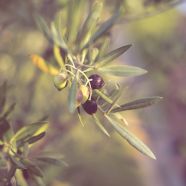





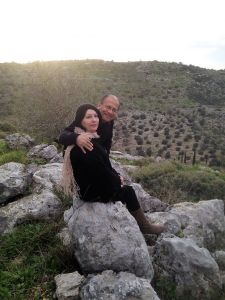
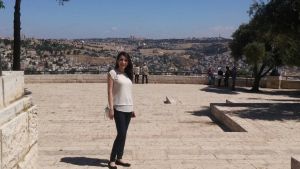
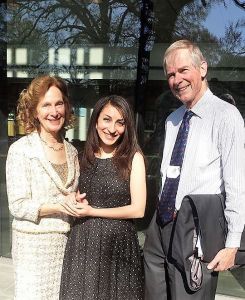
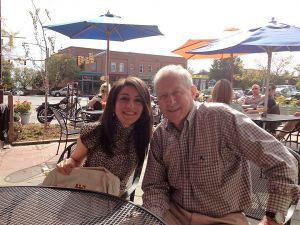
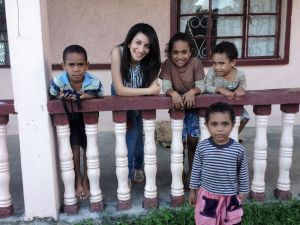
Dear Reem, Your story is such an inspiration and I am so happy I know you. When I consider how my home country is planning on removing its membership from UNESCO because of its recognition of Palestine, I grieve because I know YOU, and believe we are letting you and your family down in the struggle to bring peace to the world. Thank you for all your compassion AND passion. I am glad we are working on peace together. #GoEmpathySurplus, Chuck
Reem, I love the way you story tell. And a wonderful story. Thank you for applying your many gifts to the cause of peace. And for helping Rotarians realize their potential.